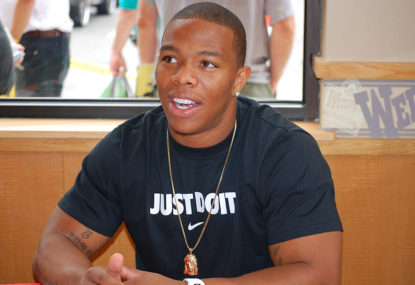James Robertson
new author
Roar Rookie

When Brett Gosper and the IRB board sit down for their next annual general meeting, there should be an item on the agenda that reads “NFL: How do we capitalise?”
Recently the NFL has been plagued with controversy and scandal, from footage surfacing of superstar running back Ray Rice assaulting his wife, to president Barack Obama stating that he would not allow his son to play the national game.
Like any business, when a competitor is vulnerable you make a move to position your product as a better alternative.
What this I propose is bold, optimistic, and somewhat crazy, but as the late, great Steve Jobs once said “it’s the crazy ones who change the world”.
The NFL is a sporting goliath. According to The Economist, during the 2013 season, 34 of the 35 most watched shows on television were NFL games. Its reach spans racial and class divides, and boosts a tax-exempt status from congress.
However it’s fallen out of favour with the masses, corporates, and even former players – some retired superstars are suing the game for health issues, and the NFL recently admitted that it expects almost a third of its players to suffer health problems like dementia.
The handling of these scandals have frustrated sponsors, and rugby should be looking at these series of events as an opportunity to position itself as an alternative for frustrated American sports fans.
The opportunity is there, which I’m sure other rival winter codes like Major League Soccer (MLS) are aware of, but what about rugby? How does rugby fit into the sporting psyche of American fans?
According to an ESPN article titled “The tour that killed American rugby”, rugby prior to the First World War was one of the most popular sports in the US but lost all its momentum shortly after a touring All Blacks side demolished their national team.
There’s no doubt that North American sports fans love entertainment, physicality and aggression when it comes to their sport; qualities that, when played the right way, rugby holds. However, one thing American sporting fans put above everything else is national pride and seeing their teams excel on the world stage. This is something that rugby union offers over its North American cousin.
The rise of Major League Soccer is a great template for rugby to follow. Its fan numbers are growing exponentially, and according to Forbes Magazine, the average MLS franchise is now worth $103 million, up more than 175 per cent over the past five years.
Rugby is in a unique position because of the abundance of talented athletes produced through the NCAA system, and the athletes that fail to make the next step and sign with a NFL side. According to the USA rugby website, there are 107,000 registered rugby players, 4000 coaches and a US sevens side that’s on the rise. It seems US rugby is a well-run organisation for aspiring NFL players to re-launch their careers and apply their trade in another code.
Carlin Isles comes to mind. Here’s a guy who couldn’t sign an NFL contract, joined the US Rugby sevens side, became a YouTube sensation, and two years later picked up an NFL contract with the Detroit lions.
The goal for the IRB should be to produce another five or six Carlin Isles leading up to the Rugby World Cup and market the hell out of them.
Looking over it, it seems like USA rugby is a perfect springboard for IRB’s next biggest opportunity. Here we have a code with a rich, 100-year history, plenty of players developed through the college system, and a well-run administration looking to take rugby next to the level.
So what’s missing?
Basically, the finances and commercial backing to develop a competition or a connection between grassroots club level to a national sporting league with strong private enterprise support and a TV rights deal that can keep the game’s finances above water.
When the USA Eagles host the All Blacks in November and the United States sees for 80 minutes a packed-out Soldiers Field, a poignant moment could dawn upon the US sporting landscape. It’s up to the IRB to leverage this opportunity to present a game that is just as tough, and equally entertaining as the NFL, but is safe enough for the country’s leader to say that his son can and should play.